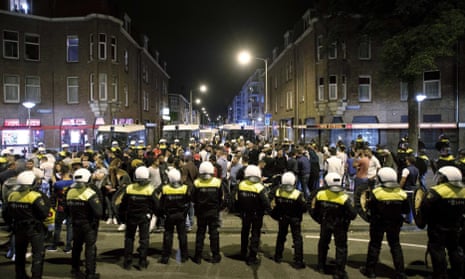About 200 people have been arrested after the fourth night of unrest in The Hague following the death of a Caribbean tourist at the hands of police.
The arrests were for breaching a ban on public assembly in the inner-city district of Schilderswijk after three nights of clashes led to the arrest of 61 people, mostly teenagers. Police chief Paul van Musscher said protesters pelted officers with stones and fireworks and threw petrol over them.
The violence first erupted on Monday night after demonstrators gathered outside a police station to protest at the death of Aruban holidaymaker Mitch Henriquez. The 42-year-old father of three died in hospital on Sunday, a day after he was pinned to the ground in a chokehold by officers at a concert in Zuiderpark.
A postmortem examination ordered by the Dutch prosecution service found he died of asphyxiation, apparently as a result of police handling.
Five officers from the city’s police division were suspended from duty on Wednesday after being identified as suspects in the case.
The incident has ignited tensions in Schilderswijk, which contains three of the 10 poorest postcodes in the Netherlands and where about 85% of the population is made up of first- or second-generation migrants.
Police stations in the area have been at the centre of allegations of brutality and discrimination by officers, claims senior officers have denied.
A report by Amnesty International in 2013 found ethnic minorities were disproportionately more likely to be stopped and searched. But police have rejected claims of systematic discrimination and pointed to research by Leiden University that concluded there was no evidence of ethnic profiling.
The city mayor, Jozias Van Aartsen, dismissed any attempt to draw comparisons to community relations in cities in the US. “If I thought that was the attitude of the police in The Hague I wouldn’t stand here for another second,” he said.

However, the national chief commissioner of the force has urged officers to tackle discrimination. In an internal blog that appeared in the media in February, Gerard Bouman said police attitudes towards Muslims had hardened and warned that “the poison of exclusion is seeping into our organisation”.
The family of Henriquez have distanced themselves from the protests and called for the clashes to stop. Alex Dijkhoff, a cousin of the dead man, told NOS news he did not believe the police handling of his relative was racially motivated. “One of the officers who was involved in the arrest was Aruban. So if you ask me, I don’t think so,” he said.
Henriquez, a self-employed businessman, was visiting relatives in The Hague when he was arrested as he left a UB40 concert. Police said he repeatedly claimed to have a gun and resisted arrest, but later confirmed he was unarmed.
One witness wrote on Facebook that Henriquez had been set upon by at least six officers, one of whom beat him on the head and legs with a baton.
An initial statement by the prosecution service said Henriquez had fallen ill in the police van and officers tried to revive him. But within hours videos were circulating on social media in which the Aruban appeared to be unconscious as three officers lifted him into the vehicle.
The government of Aruba, a constituent country of the Kingdom of the Netherlands, appealed to minsters in The Hague for a full investigation into Henriquez’s death.
The Dutch prime minister denounced the riots and said he had no plans to visit Schilderswijk. “I’m not planning to go in person to every neighbourhood where backward lilies are stirring up trouble,” Mark Rutte told journalists.
